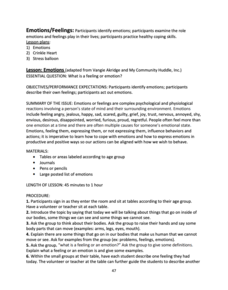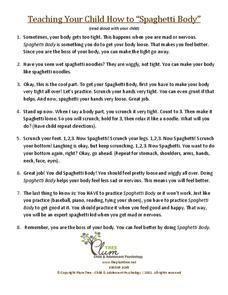Plum Tree
Teaching Your Child How to “Stress Press”
Are you or your scholars feeling stressed? Use the coping skill resource, Stress Press, to relieve the feeling that may be growing inside you when a big test or presentation is on its way.
Lions Clubs International Foundation
Mindful Self-Management Exercise: Managing Stress
An exercise offers young scholars a coping skill to manage stress or other strong emotions. Learners identify the emotion, focus on how their body feels physically, then pretend they are holding a balloon over their heads, blow their...
Plum Tree
Teaching Your Child How to "Deep Breathe"
Feeling stressed, angry, or nervous? It's time to practice the exercise detailed in Deep Breathe to breathe your cares away. The activity brings the focus back to one's self and identifies the importance of staying calm.
San Diego County District Attorney
Emotions/Feelings
Three lessons delve deep into the topic of feelings and the importance of expressing one's emotions. Through grand conversation, hands-on learning experiences, and reflective writing, scholars interpret the ups and downs of everyday...
American Psychological Association
Teaching Is Fundamental
It's important for teachers to have a strong support system—especially in the first few years of their career. Help teachers' partners, spouses, and friends understand the most compassionate ways to provide emotional support with a...
Plum Tree
Teaching Your Child How to "Spaghetti Body"
We all feel stressed at times, but we don't have to feel that way for long by practicing a coping skill called, Spaghetti Body. When a high stakes test or presentation is on its way, follow the instructions on this resource to begin the...
Overcoming Obstacles
Coping Skills
A lesson brings awareness to a variety of emotions. After discussing the many types of emotions, scholars create a list sorting emotions as easy and hard and then brainstorm coping skills. Pupils draw a picture depicting a scenario that...
Curated OER
Coping with Change
Students observe changes in their classroom. In this coping with changes instructional activity, students note the differences in the activities of the day and the changes in the classroom. Students explain changes in their lives and...
Curated OER
Managing Conflict: Channeling Anger
Help kids learn how to cope, manage, and channel their angry feelings. This slide show provides space for learners to discuss how they feel when they are angry, ways they can channel their anger, and several alternative strategies for...
Together Counts
Foundations of Wellness
You may be physically healthy, but what about mentally and emotionally? How is your social health? Kindergartners and first and second graders learn about the importance of maintaining their health in all aspects of their lives with a...
Perkins School for the Blind
A Visit to the Doctor
Going to the doctor's office may be a source of stress and uncertainty for some children. Help your learners with special needs discover what to expect at and how to cope with their next trip to the doctor. They explore real medical...
Free Printable Behavior Charts
How Do I Respond?
Help your learners respond to feelings of anger appropriately by working with them to brainstorm fitting responses to stressful situations. This organizer includes a list of anger-causing situations paired with images, a column for an...
Lions Clubs International Foundation
Introduction to Mindful Breathing
Ten minutes are all you need for a breathing exercise designed to bring calm and focus. Young scholars get their wiggles out, then shift their gaze and belly breath, paying close attention to how they physically feel.














